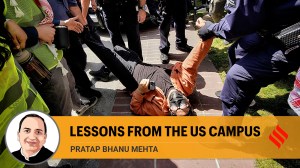- India
- International
After botched Covid-19 response, UK tackles giant vaccine rollout
Britain is taking on the biggest logistical challenge ever faced by the country’s health service: the vaccination of tens of millions of people against coronavirus in a matter of months.
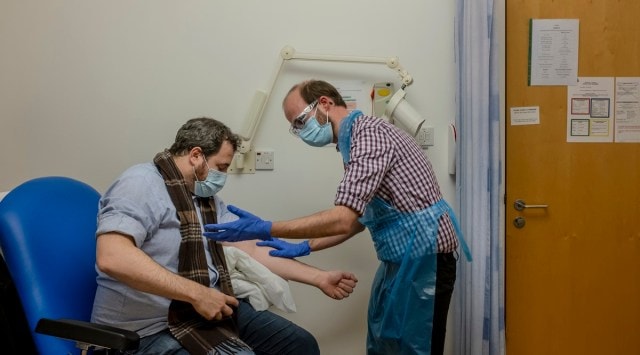 A volunteer is prepared for a vaccine booster during the Oxford Vaccine Group’s COVID-19 vaccine trials (File/Andrew Testa/The New York Times)
A volunteer is prepared for a vaccine booster during the Oxford Vaccine Group’s COVID-19 vaccine trials (File/Andrew Testa/The New York Times)Written by Stephen Castle and Elian Peltier
In Bristol, a sports stadium is being converted into a temporary clinic to provide inoculations, as is a racecourse outside London. Village halls, libraries and parking lots across the country are also being quickly turned into makeshift vaccination centers, with the government enlisting military planners for advice.
As it prepares to begin rolling out a coronavirus vaccine Tuesday, Britain is taking on the biggest logistical challenge ever faced by the country’s health service: the vaccination of tens of millions of people against coronavirus in a matter of months. At the same time, law enforcement authorities are contending with an array of potential security threats to the vaccination campaign.
Inoculations are expected to begin Tuesday at selected hospitals throughout Britain that have received the first batches of vaccine made by Pfizer and BioNTech, which need to be stored at very low temperatures. But the temporary clinics that are being hurriedly put together are expected to play critical roles as the mass vaccination program expands.
Retired health workers are being asked to help, while the National Health Service is also recruiting tens of thousands of first aid workers and others to help administer the shot, as the vaccine becomes available to progressively more people.

“I think all people who can help should put their hands up,” said Sarah Wollaston, who worked as a doctor before serving in Parliament until recently. She has just completed part of an online refresher course to qualify to help in the vaccine rollout.
“Physically, giving someone a vaccine is very straightforward,” she said. “The challenge is the logistics.”
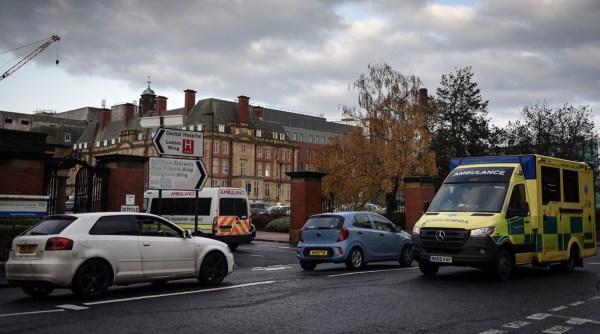 Royal Victoria Infirmary hospital in Newcastle, England, on Dec. 7, 2020. (Mary Turner/The New York Times)
Royal Victoria Infirmary hospital in Newcastle, England, on Dec. 7, 2020. (Mary Turner/The New York Times)
While industry experts and health officials grapple with that, law enforcement officers and cyber-sleuths face an equally pressing challenge in the potential security threats surrounding a product in such high demand.
“It is the most valuable asset on earth right now,” said Lisa Forte, a former British counterintelligence employee and a partner at Red Goat, a cybersecurity firm. “Naturally, this will attract highly skilled cybercriminals, criminal groups and state actors.”
Europol has warned that organized crime groups might target trucks containing vaccines for theft and hijacking, and last week Interpol warned against an “onslaught of all types of criminal activity linked to the COVID-19 vaccine,” which it has described as “liquid gold.”
87-year-old Indian-origin man first to get Covid-19 vaccine in UK
From the factory to hospitals and other sites, the Pfizer vaccine — because it has to be stored at around minus 70 degrees Celsius, or minus 94 Fahrenheit — is acutely vulnerable to sabotage, in addition to theft.
Last week, IBM said it had detected a series of cyberattacks in September against companies involved in the distribution of coronavirus vaccines across the world. IBM said the attackers, whose identity could not be determined, had tried to learn how the vaccines would be stored and delivered.
“We’ve seen petrochemical companies targeted, because they’re essential in producing dry ice used to store the vaccine,” said Claire Zaboeva, a senior cyber-threat analyst at IBM’s Security X-Force.
As nations compete to be among the first to administer the vaccine, Zaboeva added, state actors or even terrorist groups might try to disrupt deliveries. “Making loads of vaccine doses spoiled and useless, that would be a pretty destructive attack,” she said.
While security agencies look after those concerns, Britain’s health service will have the daunting problem of managing a mass vaccination program that will reach further and faster into the population than any other public health outreach in living memory.
Success is hardly guaranteed, given Britain’s spotty record on logistics during the COVID-19 crisis. In the early stages of the pandemic hospitals were left chronically short of basic protective equipment like masks and gloves, putting some workers at risk of infection.
Since then, the government has struggled to establish a test and trace system, despite budgeting around $16 billion for the much-criticized project.
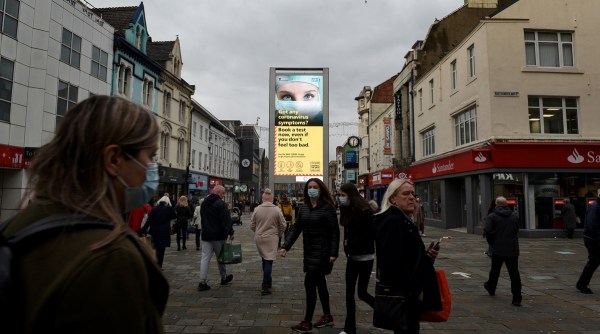 Signs alert shoppers to get tested for the the coronavirus in Newcastle, England, Monday, Dec. 7, 2020, if they are showing signs of the virus. (Mary Turner/The New York Times)
Signs alert shoppers to get tested for the the coronavirus in Newcastle, England, Monday, Dec. 7, 2020, if they are showing signs of the virus. (Mary Turner/The New York Times)
Already, Pfizer’s problems sourcing raw materials may force it to cut the number of vaccine doses promised for delivery this year to Britain possibly by around half, to 5 million. And there is a potential bottleneck in the production of dry ice needed for packing and shipping the vaccine.
Yet experts are cautiously optimistic that the vaccine rollout will go better than the government’s earlier, fumbling efforts to address the pandemic because it will be handled under the umbrella of the National Health Service, which has extensive experience with organizing mass immunizations, like annual flu shots.
“It is not going to be without problems because of its scale and the logistics — I would be amazed if, in six months something, somewhere, didn’t go wrong,” said Helen Buckingham, director of strategy and operations at the Nuffield Trust, a research institute specializing in health.
But the concept of mass vaccination is a familiar one, she added, “and overall people are putting a lot of effort into making this work.”
Vaccines will be offered at three different types of locations: hospitals; doctors’ offices and clinics; and temporary vaccination centers still being prepared, including drive-thru sites, sports stadiums and public buildings. Family doctors, who will carry much of the burden, can call on their experience of giving at least 15 million flu shots each year.
Coronavirus vaccination will be different for several reasons, however. In addition to the Pfizer and BioNTech vaccine, Britain is likely to authorize at least two others, one produced by Moderna and another by AstraZeneca and the University of Oxford. But when and where each one will be available is unclear.
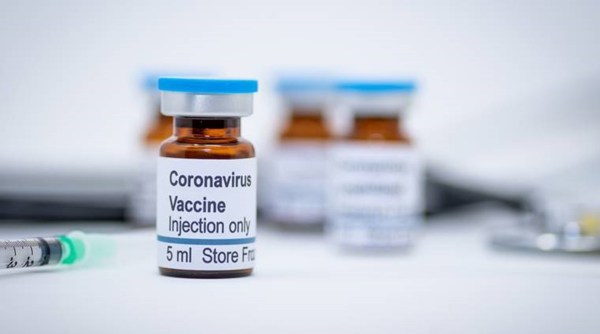 NHS national medical director, Professor Stephen Powis, has warned that the roll out of a vaccine will be a “marathon” not a sprint. (File Photo)
NHS national medical director, Professor Stephen Powis, has warned that the roll out of a vaccine will be a “marathon” not a sprint. (File Photo)
Martin Marshall, chair of the council of the Royal College of General Practitioners, notes that refrigeration requirements particularly for the Pfizer and Moderna vaccines introduce a complication doctors do not have to manage with flu shots. Both require a second injection after several weeks, which can be an administrative nightmare.
“We are pretty used to delivering big vaccination programs, but of course no one has ever had to deliver one in a situation where the vaccinations don’t come through in pre-filled syringes,” Marshall said.
Early plans to vaccinate nursing home residents have been shelved because of the deceptively vexing issue of how to break down the 975-dose batches that Pfizer ships and safely take them into those facilities. And it is unclear when — and in what quantity — other vaccines will become available.
All this has to be done at a time when the health care sector is under acute strain, its staff stretched after months of relentless pressure and during a winter season when people are generally more susceptible to illness.
Nonetheless, Marshall is confident that the vaccine rollout can succeed.
“I think we can make this work if we work across the NHS and show some flexibility,” he said. “It plays to the strength of the NHS, which is a centralized, organized and managed system — and it plays to our values as well.”
Best of Express

Apr 28: Latest News
- 01
- 02
- 03
- 04
- 05
























